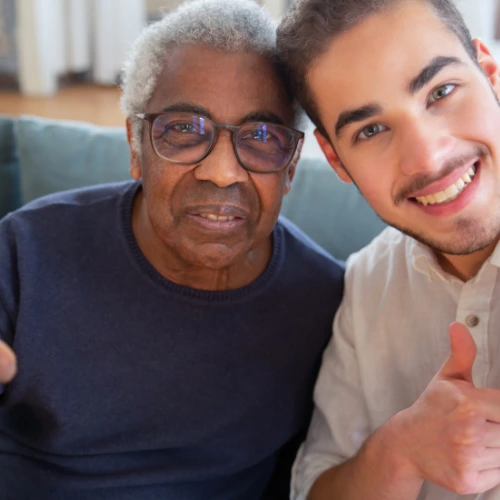How to Interview a Caregiver for the Elderly: Finding the Perfect Match
Let’s dive into the art of interviewing caregivers for the elderly. Whether you’re seeking assistance for yourself or a loved one, finding a caregiver who is reliable, compassionate, and skilled is crucial. In this blog post, I will walk you through the process of interviewing potential caregivers, offering valuable insights and tips along the way. So grab a cup of tea and let’s get started!
Understanding Your Needs
Before you embark on the caregiver interview journey, take some time to reflect on the specific needs of the elderly person in question. Consider their medical conditions, daily routines, and any personal preferences they may have. By having a clear understanding of your requirements, you’ll be better equipped to find the right caregiver fit.
Preparing for the Interview

Now that you have a good grasp of your needs, it’s time to prepare for the caregiver interview. Start by compiling a list of questions that will help you assess the candidate’s skills, experience, and personality. Here are a few key areas to cover:
1. Experience and Qualifications
- How many years of experience do you have as a caregiver?
- Have you worked with individuals with similar medical conditions before?
- Are you certified in any specific caregiving courses?
2. Daily Care and Assistance
- How would you handle medication management?
- What strategies would you use to ensure the elderly person’s safety at home?
- Can you assist with personal care tasks such as bathing and grooming?
3. Communication and Empathy
- How do you build rapport with elderly individuals?
- Can you provide an example of a challenging situation you faced and how you resolved it?
- How would you handle conflicts or disagreements with the elderly person or their family?
4. Availability and Flexibility
- What is your preferred working schedule?
- Are you open to occasional overnight shifts or weekend work?
- How would you handle emergencies or unexpected situations?
The Interview Process
Now that you have your questions ready, it’s time to conduct the caregiver interviews. Remember, the goal is to find someone who not only possesses the necessary skills but also connects well with the elderly person. Here are a few pointers for the interview process:
1. Initial Phone Screening
Begin with a brief phone call to get a sense of the caregiver’s demeanor and communication style. You can ask basic questions to determine if they meet your initial criteria before inviting them for an in-person interview.
2. Face-to-Face Interview
During the in-person interview, observe the caregiver’s body language and interpersonal skills. Are they attentive, empathetic, and respectful? Share details about the elderly person’s needs and gauge their reactions and responses. Don’t forget to ask for references and verify their credentials.
3. Practical Assessment
Consider conducting a practical assessment where the caregiver spends some time interacting with the elderly person. This will give you a better understanding of their ability to connect with and care for the individual. Observe how they handle tasks, communicate, and adapt to different situations.
Assessing Compatibility and Making a Decision
Once you’ve completed the interviews, it’s time to assess the compatibility of the potential caregivers. Reflect on their qualifications, skills, and how well they aligned with the needs and preferences you outlined earlier. Take into account their compatibility with the elderly person, as building a positive and trusting relationship is essential for effective care.
Additionally, consider the caregiver’s availability, rates, and terms of service. While cost is important, remember that quality care often comes at a fair price. It’s better to invest in a reliable and skilled caregiver who may charge a bit more than to compromise on the quality of care.
After weighing all these factors, make your decision and select the caregiver who you believe is the best fit for the elderly person’s needs. Inform them of your decision and discuss the next steps, such as setting up a trial period to ensure compatibility before finalizing the arrangement.
Ongoing Communication and Evaluation
Remember, the journey doesn’t end with the hiring process. Ongoing communication and evaluation are essential to ensure that the caregiver is providing the best possible care for your loved one. Here’s what you can do:
1. Regular Check-Ins
Maintain open lines of communication with the caregiver. Schedule regular check-ins to discuss any concerns, updates, or changes in the elderly person’s condition or needs. These meetings can also be an opportunity to provide feedback and show appreciation for their hard work.
2. Evaluate Performance
Assess the caregiver’s performance periodically. Are they meeting the expectations outlined during the interview process? Are they adapting well to any changes in the elderly person’s condition? Keep track of any issues or areas for improvement and address them promptly.
3. Encourage Feedback
Foster a culture of open communication by inviting feedback from both the caregiver and the elderly person. This will create an environment where everyone feels comfortable expressing their needs, concerns, or suggestions. Actively listen to their input and make necessary adjustments to improve the caregiving experience.
What questions should I ask to assess a caregiver’s ability to handle medical conditions?
Assessing a caregiver’s ability to handle medical conditions is of utmost importance when entrusting the well-being of a loved one into someone else’s care. The right questions can provide valuable insights into their knowledge, experience, and approach to managing various health-related situations.
Whether you’re seeking assistance for an aging parent or a family member with specific medical needs, here are key inquiries to help you make an informed decision:
1. Can you provide an overview of your healthcare background and training? Understanding their educational and professional qualifications will shed light on their foundational knowledge of medical conditions and caregiving techniques. Look for certifications, degrees, or relevant courses they have completed.
2. What specific medical conditions have you dealt with in the past? Inquire about their firsthand experience in managing conditions similar to those affecting your loved one. This question reveals their familiarity with specific challenges, protocols, and potential complications.
3. How do you stay updated on medical advancements and best practices? Caregivers who actively pursue ongoing education and stay informed about the latest medical developments demonstrate a commitment to providing the best care. Look for responses mentioning seminars, workshops, or professional memberships.
4. Can you describe a challenging medical situation you’ve encountered and how you resolved it? This question assesses problem-solving skills, adaptability, and critical thinking abilities. Listen for their ability to navigate complex scenarios, prioritize tasks, and maintain composure under pressure.
5. How do you ensure medication management is accurate and timely? Medication errors can have serious consequences, so understanding their approach to medication administration is crucial. Look for meticulousness, familiarity with drug interactions, and proper documentation practices.
6. How do you handle medical emergencies or urgent situations? Gauge their ability to remain calm and composed in high-stress situations. Look for knowledge of basic life support techniques, first aid training, and their understanding of when to escalate emergencies to healthcare professionals.
7. How do you collaborate with healthcare providers and communicate updates? A caregiver’s ability to liaise with doctors, nurses, and therapists is vital for coordinating comprehensive care. Look for effective communication skills, such as active listening, accurate reporting, and adherence to privacy regulations.
8. Can you provide references from previous clients or healthcare professionals? Requesting references allows you to gain insights from others who have firsthand experience working with the caregiver. It provides an opportunity to validate their claims and assess their reputation.
Remember, while the questions you ask are essential, equally important is observing their demeanor, empathy, and interpersonal skills during the interview. Assessing their ability to build rapport and establish trust with their loved ones is equally vital for a successful caregiving relationship.
By asking these thoughtful questions, you’ll be better equipped to assess a caregiver’s ability to handle medical conditions and make an informed decision that ensures the well-being and comfort of your loved one.
How can I ensure that a caregiver is empathetic and can build rapport with the elderly person?
Building rapport and ensuring empathy in a caregiver working with the elderly is crucial for creating a positive and nurturing environment. Here are several key considerations to help ensure that a caregiver possesses these qualities:
Recruitment and selection process
Begin by implementing a comprehensive recruitment and selection process. Clearly outline the desired qualities, such as empathy, patience, and communication skills, in the job description. Conduct thorough interviews to assess a candidate’s ability to connect with others and show empathy.
Experience and training
Look for caregivers who have experience working with the elderly or have received specialized training in geriatric care. This background demonstrates an understanding of the unique needs and challenges faced by older adults and can enhance their ability to build rapport.
Assessing empathy
During the selection process, use behavioral questions and role-playing scenarios to evaluate a candidate’s empathy. Ask them about specific situations they have encountered in their previous roles and how they handled them. Evaluate their ability to actively listen, show compassion, and understand the emotional needs of the elderly.
Background checks and references
Perform background checks and contact references to gather more information about a caregiver’s previous experiences. This process can provide insights into their professionalism, reliability, and ability to build rapport with elderly clients.
Cultural sensitivity

Consider the cultural background and diversity of the caregiver. An individual who is familiar with and sensitive to different cultural practices and norms can better understand and connect with elderly individuals from diverse backgrounds.
Emotional intelligence training
Provide ongoing training and professional development opportunities that focus on emotional intelligence and empathy. These programs can help caregivers enhance their ability to recognize and understand the emotions of the elderly and respond appropriately.
Communication skills

Strong communication skills are essential for building rapport. Ensure that caregivers can effectively express themselves, actively listen, and understand non-verbal cues. Encourage open and honest communication between caregivers, the elderly person, and their family members.
Person-centered care
Emphasize the importance of person-centered care, which focuses on tailoring caregiving approaches to meet the unique needs and preferences of each individual. Encourage caregivers to engage in meaningful conversations, learn about the elderly person’s life history, and integrate their preferences into the caregiving routine.
Regular feedback and evaluation
Implement a system for providing feedback and evaluating the caregiver’s performance. Regularly communicate with both the caregiver and the elderly person or their family to ensure that the caregiver is meeting the desired standards of empathy and rapport-building.
Remember, building rapport and empathy takes time and effort. It is essential to foster a supportive and empathetic culture within the caregiving organization and promote an environment that values and prioritizes the emotional well-being of both caregivers and the elderly.
Are there any red flags or warning signs to watch out for when hiring a caregiver for a loved one?
When seeking a caregiver for your loved one, it is crucial to proceed with caution and be mindful of potential warning signs and red flags. Ensuring the well-being, safety, and comfort of your family member is of utmost importance. By being aware of these indicators, you can make an informed decision that will provide the best care for your loved one.
Lack of Credentials and Experience
One of the initial warning signs is the absence of relevant qualifications and experience. A caregiver should possess the necessary certifications, training, and expertise to handle the specific needs of your loved one. Pay attention to any discrepancies or inconsistencies in their claims and verify their credentials thoroughly.
Negative or Dubious References
References play a vital role in evaluating the suitability of a caregiver. When contacting references, be attentive to any negative feedback or hesitation in their responses. Additionally, be cautious if the candidate fails to provide references or if the references themselves raise concerns.
Inconsistent or Evasive Communication
Effective communication is crucial between the caregiver, your family, and the care recipient. Take note if the caregiver provides inconsistent answers or avoids certain topics during interviews. Evasive behavior may indicate a lack of transparency or an attempt to conceal relevant information.
Lack of Empathy and Patience

A compassionate and patient caregiver is essential for providing the necessary emotional support and care. Observe the caregiver’s demeanor during interviews and assess their ability to handle stressful situations with composure. Any signs of impatience or a lack of empathy should not be overlooked.
Unprofessional Behavior and Attitude

A caregiver’s professionalism is a key factor in providing quality care. Be wary of any negative or dismissive attitude, disrespect, or unprofessional behavior during the hiring process. A caregiver should maintain a high standard of conduct and foster a respectful environment.
Neglect of Personal Hygiene

Proper personal hygiene is essential in a caregiver’s role. Pay attention to their appearance and hygiene during interviews. Persistent unkemptness, poor personal hygiene, or an unclean appearance may indicate a lack of professionalism and attention to detail.
Unexplained Employment Gaps
Carefully review the caregiver’s employment history and inquire about any unexplained gaps. These gaps may raise concerns about reliability, commitment, or potential issues that have not been disclosed.
Reluctance to Sign a Contract or Trial Period
A caregiver who is hesitant to sign a contract or engage in a trial period may have something to hide or may not be committed to a long-term arrangement. Establishing clear expectations and having a formal agreement ensures transparency and protects the interests of all parties involved.
Financial Irregularities
Trustworthiness in financial matters is essential when hiring a caregiver. Look for any signs of financial irregularities, such as missing money or unauthorized use of personal belongings or credit cards. Vigilance in this aspect is crucial for safeguarding your loved one’s finances.
Inadequate Knowledge of Medical Conditions
A caregiver should possess the necessary knowledge and understanding of the specific medical conditions and needs of their loved one. Assess their familiarity with the condition and evaluate their ability to handle any potential medical challenges.
Choosing the right caregiver requires careful consideration and attention to warning signs and red flags. By keeping an eye out for these indicators, you can make an informed decision and ensure the well-being and safety of your loved one. Remember to thoroughly vet potential caregivers, trust your instincts, and prioritize open communication throughout the hiring process.
Conclusion
Choosing a caregiver for the elderly is a significant decision, as it directly impacts their quality of life and well-being. By following these steps and conducting thorough interviews, you increase the chances of finding a caregiver who will provide compassionate and professional care.
Remember, the interview process is not just about checking qualifications and experience; it’s also about finding someone who connects with the elderly person on a personal level. Trust your instincts and take the time to evaluate each candidate thoroughly.
I hope this guide has provided valuable insights and tips to help you navigate the caregiver interview process. Now it’s your turn! Have you ever interviewed a caregiver for the elderly?
What challenges did you face, and how did you overcome them? Share your experiences and thoughts in the comments below. Let’s engage in a meaningful conversation and learn from each other!
